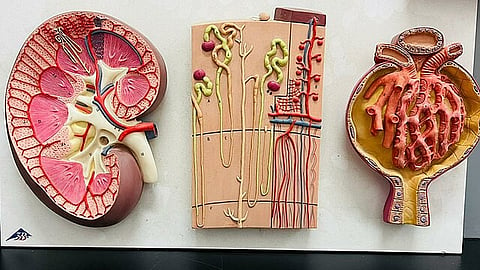

Combining a low dose of blood pressure medication with a higher intake of dietary-resistant starch might help stave off diabetic kidney disease, according to results from a new animal study. Kidney disease is a common diabetes complication and the leading cause of end-stage kidney failure. Researchers will present their work this week at the American Physiology Summit, the flagship annual meeting of the American Physiological Society (APS), in Long Beach, California.
Although blood pressure medicines have been shown to protect kidney function, high doses can cause dehydration, very low blood pressure and electrolyte imbalance.
Dietary-resistant starch is found in unripe bananas, cooked and cooled potatoes, legumes and whole grains. This type of carbohydrate isn’t digested in the small intestine like most foods. Instead, it ferments in the large intestine, where it feeds beneficial gut bacteria.
Carrillo’s research team previously showed that giving rat models of Type 1 and Type 2 diabetes a diet high in resistant starch—where 35% to 50% of their carbohydrates were from resistant starch—prevented symptoms of declining kidney function. Although these results were promising, a dietary intervention requiring so much resistant starch is not practical.
“In this new study, we wanted to explore a dietary intervention that was more feasible to implement for diabetic patients in their daily lives,” Carrillo said. “We opted to combine this dietary intervention at a lower dosage than before—equivalent to 5 to 10% of consumed carbohydrates from resistant starch—with low-dose renin-angiotensin system inhibitor, a blood pressure medication that had been shown to elicit the same effect on kidney health.”
The study results, together with gene and protein expression analyses, also showed that the combined intervention imparted a protective effect on the kidney by modulating the renal renin-angiotensin system. This critical hormonal system helps regulate blood pressure and fluid balance in the body.
“Our research provides more information toward understanding diabetes complications, especially related to kidney health,” Carrillo said. “This work could be used to investigate possible translatable strategies that use a whole food source and already well-used medication to minimize the risk for these complications.”
The researchers are getting ready to begin a related study that will use Type 1 diabetic rats to find out if the results seen with Type 2 diabetes animals differ in an insulin-deficient model. They also plan to explore how other types of fiber, such as whole oats, might affect kidney health, and they want to study the microbiome’s role in the drug-diet intervention.
(Newswise/AP)
